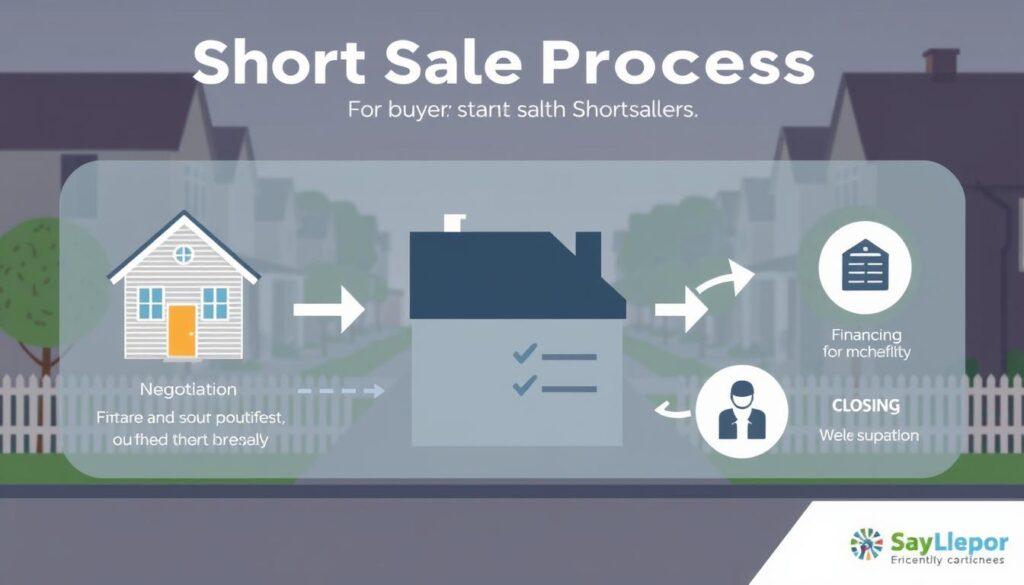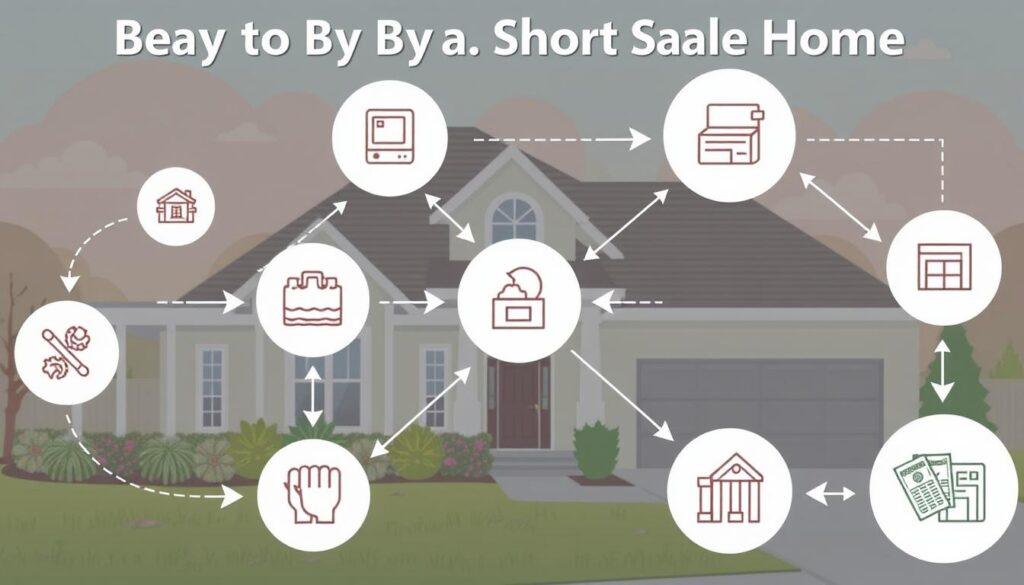Ever thought about why buying a short sale home could be a smart move? Despite the common belief that these deals are too complex, they offer unique chances. In this short sale buyer guide, we’ll cover everything you need to know about short sales. From what a short sale is to how to buy one successfully.
Short sales are different from regular real estate deals and are less common today. Yet, they have big advantages like saving money and less competition. Knowing how this process works can help you get your dream home, even with its challenges. It’s key for buyers to be ready and know the short sale process for buyer to avoid problems. Let’s explore the short sale journey together.
Key Takeaways
- Short sales can offer substantial cost savings compared to traditional home purchases.
- Understanding the unique characteristics of short sales is crucial in the buying process.
- Choosing a qualified real estate agent experienced in short sales can make a significant difference.
- Buyers should be prepared for potentially lengthy wait times and complex interactions with lenders.
- Home inspections are essential to ensure you are aware of any repairs needed for the property.
Understanding Short Sales
Getting to know short sales as a buyer means understanding their basics. These real estate deals can seem complex, but knowing key points helps make better choices.
Definition of a Short Sale
A short sale happens when a house sells for less than what’s owed on the mortgage. This is usually because the homeowner wants to avoid foreclosure. The lender agrees to accept less money, which can take time to settle.
Key Characteristics of Short Sales
Short sales have some important traits. Buyers should know that:
- All proceeds from the sale go to the lender: The homeowner doesn’t get any money from the deal.
- Homeowners remain in control during the process: Unlike foreclosure, homeowners can stay in their home while negotiations happen.
- Potential for multiple parties: Short sales might involve talks with several lienholders, making things more complicated.
- Time considerations: Short sales can take a while, often three to five months to complete.
- Renovation needs: Many short sale homes need a lot of work, which can be a big challenge.
Knowing these traits helps buyers deal with short sales better. It’s about understanding the negotiations, possible delays, and the condition of the homes. This knowledge is crucial for making informed decisions.
Why Consider Buying a Short Sale Property?
Buying a short sale property has many benefits. These homes often sell for less than their market value. This is because the homeowner is in financial trouble and needs to sell fast.
While saving money is a big plus, it’s important to check the home’s condition and the risks involved.
Potential Cost Savings
Buying a short sale property can save you a lot of money. These homes are usually priced lower than similar homes. This is because lenders want to minimize their losses.
However, it’s crucial to negotiate a fair price. A very low offer might not be accepted by lenders.
Condition of Short Sale Homes
The condition of short sale homes can vary. Sometimes, these homes are well-kept because the owner still lives there. This is different from foreclosed homes, which are often neglected.
Keep in mind that short sale homes are sold “as is.” This means you can’t ask for price changes based on inspections. It’s wise to do your homework and ask for inspections to know what repairs might cost.
While buying a short sale property has its perks, there are also challenges. Deals can take a long time to close, sometimes months. You’ll need to be patient and ready for complex negotiations.
It’s important to understand all aspects before deciding to buy a short sale property. This way, you can make a well-informed choice.
| Aspect | Short Sale Properties | Foreclosed Properties |
|---|---|---|
| Price | Often competitively priced for potential cost savings | Tends to be priced for quick liquidation |
| Condition | Generally well-maintained by current owner | Frequently suffers from neglect |
| Negotiation | Possible, but often complex and may require patience | Less negotiation due to lender’s desire for quick sale |
| Timeline | Takes longer, potentially 6 months or more | Typically shorter due to quick bank processes |
The Short Sale Process for Buyer
Understanding the short sale process for buyers takes patience and strategy. It’s similar to buying a home, but with extra steps and communication. Key players like real estate agents and lenders are crucial in this journey.
Overview of the Buying Process
The first step is finding a suitable property. After finding a home, the buyer makes an offer. The seller must show financial hardship for the sale to move forward.
It’s key to offer close to the mortgage amount to increase chances of acceptance. The short sale process can take 60 to 120 days for lender approval. Buyers may wait up to 30 days for the bank to get the file, then another 30 days per negotiator. Final approval can take two to eight weeks.
Delays and uncertainty can cause frustration. It’s vital to get regular updates from the bank and work with a knowledgeable agent.
Role of the Mortgage Lender
Lenders are key in the short sale process. They check if the seller has financial hardship and not enough equity to cover the mortgage. Lenders aim to avoid long foreclosure processes by approving short sales.
Knowing the lender’s view helps buyers understand the process. Working with an experienced agent can speed up negotiations and improve communication. Both parties need patience, as approval times vary based on property and documentation accuracy. Persistence and attention to detail can lead to a successful short sale.

| Step | Duration | Description |
|---|---|---|
| Bank File Receipt | Up to 30 days | Time taken for the bank to receive the short sale file. |
| Negotiator Response | 30 days per negotiator | Each negotiator may take this length to review and respond. |
| Final Approval | 2 to 8 weeks | Period required for the lender to finalize the decision. |
| Total Process Duration | 60 to 120 days | Overall time frame for accepting a short sale offer. |
Steps to Buying a Short Sale Home
Buying a short sale home comes with its own set of challenges. Knowing the right steps can make this process easier. Start with these key steps to build a strong foundation.
Finding a Qualified Real Estate Agent
Finding an agent who knows short sales is crucial. They can guide you through the process and help with negotiations. This is important because lenders decide whether to accept an offer.
Getting Pre-Approved for Financing
Getting pre-approved shows you’re ready to buy. It makes your offer stronger. Prepare your financial documents early to speed up approval. This can be a big advantage in securing your home.
Making a Competitive Offer
A competitive offer is key. Make sure it’s based on fair market value and includes an earnest money deposit. This shows you’re serious. Remember, short sales are often in demand, so be prepared for a long wait.

| Aspect | Details |
|---|---|
| Duration of Process | Can take up to a year from submission to possession |
| Bank Acknowledgment | May take up to 30 days for offer acknowledgment |
| Buyer Preparation | Need for pre-approval and strong market analysis |
| Agent’s Role | Essential for navigating the complexities |
| Offer Submission | Must reflect fair market value supported by data |
| Potential Opportunities | Can provide bargains in desirable neighborhoods |
By following these steps, you can navigate the short sale process successfully. Stay informed and proactive to make the most of this opportunity.
Common Challenges in the Short Sale Process
Navigating short sales for buyers comes with its own set of hurdles. One big challenge is dealing with multiple lenders. Each lender’s approval is key to a successful short sale, leading to complex negotiations. This can make the process longer.
When there are many lenders, negotiations get harder. Buyers might wait weeks or even months to close the deal.
Dealing with Multiple Lenders
Lenders don’t always share the condition of homes, adding complexity. Buyers need to know that the seller’s financial situation can affect approval. It’s important to be patient and understand the challenges of dealing with many lenders.
Potential Delays and Rejections
Delays and rejections are common in short sales. The whole process can take three to nine months. Delays often come from missing documents or misunderstandings.
Offers that seem too low to lenders are often rejected. They want to get the best price for their distressed properties. Buyers should be ready for slow timelines, unlike regular real estate deals.
Understanding these challenges can help buyers make better decisions in the short sale process.
For more on overcoming these challenges, check out this resource.
Tips for Buyers in the Short Sale Process
Buying a home through a short sale needs patience and flexibility. Buyers should know that long wait times are common. Lenders often take a lot of time to approve deals, causing delays.
Staying in touch with your agent and the lender helps manage these waits. Remember, it’s a common experience for many buyers.
Be Prepared for Long Wait Times
Buyers should prepare for possible delays that can last months. This is especially true for properties with multiple lenders. Decisions from each lender can take up to two months or more.
This makes timelines hard to predict. Being flexible and understanding the slower pace is wise.
Consider Contingencies in Your Offer
Adding contingencies to your offer can protect you. Aspects like home inspections and financing approvals are key. These tips for buyers in the short sale process help you make informed decisions.
Learning about these factors can make your experience smoother. It prepares you for the complex negotiations ahead.






